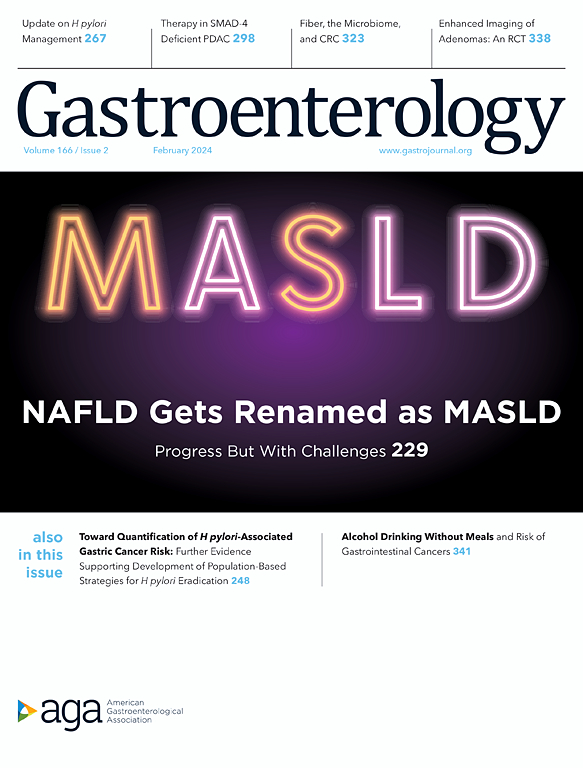Glucagon-like peptide-1 Receptor Agonists and Gastrointestinal Adverse Events: a Systematic Review and Meta-analysis
IF 25.7
1区 医学
Q1 GASTROENTEROLOGY & HEPATOLOGY
引用次数: 0
Abstract
Background and aims
Glucagon-like peptide-1 receptor agonists (GLP-1RAs) are widely used for glycemic control or weight management in patients with type 2 diabetes mellitus (T2DM) or overweight/obesity. However, there are concerns regarding their association with serious gastrointestinal adverse events though findings have been inconsistent.Methods
We systematically searched 5 databases for placebo-controlled randomized controlled trials (RCTs) assessing GLP-1RAs in patients with T2DM, overweight/obesity, or Non-Alcoholic Steatohepatitis (NASH)/Metabolic dysfunction-associated steatotic liver disease (MASLD). We included trials that reported cholecystitis, cholelithiasis, cholangitis, cholestasis, pancreatitis, gastroesophageal reflux disease (GERD), gastritis, esophagitis, gastrointestinal ischemia, gastrointestinal hemorrhage, intestinal obstruction, paralytic ileus, gastrointestinal ulceration, gastrointestinal perforation, or gastroparesis. Meta-analyses were performed using a random-effects model, with subgroup analyses evaluating risks based on patient population, GLP-1RA versus dual agonist formulation, weight loss profile, dosing, and duration of action.Results
We included 55 randomized controlled trials involving 106,395 participants. GLP-1RAs increased the risk of cholelithiasis (RR 1.46, 95% CI 1.09–1.97; 2 more cases per 1,000) and probably increased the risk of GERD (RR 2.19, 95% CI 1.48–3.25; 4 more cases per 1,000) compared to placebo. GLP-1RAs probably have little or no effect on the risk of other gastrointestinal or biliary events. Subgroup analyses showed that the increased risks of cholelithiasis and GERD were more pronounced in trials including individuals with overweight/obesity or NASH/MASLD, weight-loss-inducing GLP-1RAs, or high-dose formulations, although these subgroup effects were not statistically significant.Conclusions
GLP-1RAs are associated with an increased risk of cholelithiasis and GERD but do not appear to increase the risk of other gastrointestinal or biliary adverse events.

胰高血糖素样肽-1受体激动剂和胃肠道不良事件:系统回顾和荟萃分析
背景和目的胰高血糖素样肽-1受体激动剂(GLP-1RAs)广泛用于2型糖尿病(T2DM)或超重/肥胖患者的血糖控制或体重管理。然而,人们担心它们与严重的胃肠道不良事件有关,尽管研究结果不一致。方法我们系统地检索了5个数据库,以评估GLP-1RAs在T2DM、超重/肥胖或非酒精性脂肪性肝炎(NASH)/代谢功能障碍相关脂肪性肝病(MASLD)患者中的作用。我们纳入了报道胆囊炎、胆石症、胆管炎、胆汁淤积、胰腺炎、胃食管反流病(GERD)、胃炎、食管炎、胃肠缺血、胃肠出血、肠梗阻、麻痹性肠梗阻、胃肠溃疡、胃肠穿孔或胃轻瘫的试验。采用随机效应模型进行meta分析,亚组分析基于患者群体、GLP-1RA与双重激动剂配方、体重减轻情况、剂量和作用时间评估风险。结果纳入55项随机对照试验,共纳入106395名受试者。GLP-1RAs增加胆石症的风险(RR 1.46, 95% CI 1.09-1.97;每1000例增加2例),并可能增加GERD的风险(RR 2.19, 95% CI 1.48-3.25;每1000例中多4例)。GLP-1RAs可能对其他胃肠道或胆道事件的风险影响很小或没有影响。亚组分析显示,在包括超重/肥胖或NASH/MASLD、诱导减肥的GLP-1RAs或高剂量制剂的试验中,胆结石和胃食管反流的风险增加更为明显,尽管这些亚组效应没有统计学意义。结论:glp - 1ras与胆石症和胃食管反流的风险增加有关,但似乎不会增加其他胃肠道或胆道不良事件的风险。
本文章由计算机程序翻译,如有差异,请以英文原文为准。
求助全文
约1分钟内获得全文
求助全文
来源期刊

Gastroenterology
医学-胃肠肝病学
CiteScore
45.60
自引率
2.40%
发文量
4366
审稿时长
26 days
期刊介绍:
Gastroenterology is the most prominent journal in the field of gastrointestinal disease. It is the flagship journal of the American Gastroenterological Association and delivers authoritative coverage of clinical, translational, and basic studies of all aspects of the digestive system, including the liver and pancreas, as well as nutrition.
Some regular features of Gastroenterology include original research studies by leading authorities, comprehensive reviews and perspectives on important topics in adult and pediatric gastroenterology and hepatology. The journal also includes features such as editorials, correspondence, and commentaries, as well as special sections like "Mentoring, Education and Training Corner," "Diversity, Equity and Inclusion in GI," "Gastro Digest," "Gastro Curbside Consult," and "Gastro Grand Rounds."
Gastroenterology also provides digital media materials such as videos and "GI Rapid Reel" animations. It is abstracted and indexed in various databases including Scopus, Biological Abstracts, Current Contents, Embase, Nutrition Abstracts, Chemical Abstracts, Current Awareness in Biological Sciences, PubMed/Medline, and the Science Citation Index.
 求助内容:
求助内容: 应助结果提醒方式:
应助结果提醒方式:


